Generic Name
Abiraterone Acetate
Brand Names
Abiraterone, Zytiga, Akeega, YONSA, Abirtega
FDA approval date: April 28, 2011
Classification: Cytochrome P450 17A1 Inhibitor
Form: Tablet
What is Abiraterone (Abiraterone Acetate)?
Abiraterone acetate tablets are indicated in combination with prednisone for the treatment of patients with Metastatic castration-resistant prostate cancer Metastatic high-risk castration-sensitive prostate cancer Abiraterone acetate tablets are a CYP17 inhibitor indicated in combination with prednisone for the treatment of patients with metastatic castration-resistant prostate cancer . metastatic high-risk castration-sensitive prostate cancer .
Approved To Treat
Top Global Experts
There are no experts for this drug
Save this treatment for later
Not sure about your diagnosis?
Tired of the same old research?
Related Clinical Trials
There is no clinical trials being done for this treatment
Related Latest Advances
There is no latest advances for this treatment
Brand Information
Abiraterone (Abiraterone acetate)
1INDICATIONS AND USAGE
Abiraterone acetate tablets are indicated in combination with prednisone for the treatment of patients with
- Metastatic castration-resistant prostate cancer (CRPC)
- Metastatic high-risk castration-sensitive prostate cancer (CSPC)
2DOSAGE FORMS AND STRENGTHS
Abiraterone acetate tablets 250 mg are white to off-white, oval-shaped tablets debossed with "WW597" on one side.
3CONTRAINDICATIONS
None.
4ADVERSE REACTIONS
The following are discussed in more detail in other sections of the labeling:
- Hypokalemia, Fluid Retention, and Cardiovascular Adverse Reactions due to Mineralocorticoid Excess
- Adrenocortical Insufficiency
- Hepatotoxicity
- Increased Fractures and Mortality in Combination with Radium Ra 223 Dichloride
4.1Clinical Trial Experience
Because clinical trials are conducted under widely varying conditions, adverse reaction rates observed in the clinical trials of a drug cannot be directly compared to rates in the clinical trials of another drug and may not reflect the rates observed in clinical practice.
Two randomized placebo-controlled, multicenter clinical trials (COU-AA-301 and COU-AA-302) enrolled patients who had metastatic CRPC in which abiraterone acetate was administered orally at a dose of 1,000 mg daily in combination with prednisone 5 mg twice daily in the active treatment arms. Placebo plus prednisone 5 mg twice daily was given to patients on the control arm. Another randomized placebo-controlled, multicenter clinical trial (LATITUDE) enrolled patients who had metastatic high-risk CSPC in which abiraterone acetate was administered at a dose of 1,000 mg daily in combination with prednisone 5 mg once daily. Placebos were administered to patients in the control arm. Additionally, two other randomized, placebo-controlled trials were conducted in patients with metastatic CRPC. The safety data pooled from 2230 patients in randomized controlled trials constitute the basis for the data presented in the Warnings and Precautions, Grade 1-4 adverse reactions, and Grade 1-4 laboratory abnormalities. In all trials, a gonadotropin-releasing hormone (GnRH) analog or prior orchiectomy was required in both arms.
In the pooled data, median treatment duration was 11 months (0.1, 43) for abiraterone acetate-treated patients and 7.2 months (0.1, 43) for placebo-treated patients. The most common adverse reactions (≥10%) that occurred more commonly (>2%) in the abiraterone acetate arm were fatigue, arthralgia, hypertension, nausea, edema, hypokalemia, hot flush, diarrhea, vomiting, upper respiratory infection, cough, and headache. The most common laboratory abnormalities (>20%) that occurred more commonly (≥2%) in the abiraterone acetate arm were anemia, elevated alkaline phosphatase, hypertriglyceridemia, lymphopenia, hypercholesterolemia, hyperglycemia, and hypokalemia. Grades 3-4 adverse events were reported for 53% of patients in the abiraterone acetate arm and 46% of patients in the placebo arm. Treatment discontinuation was reported in 14% of patients in the abiraterone acetate arm and 13% of patients in the placebo arm. The common adverse events (≥1%) resulting in discontinuation of abiraterone acetate and prednisone were hepatotoxicity and cardiac disorders.
Deaths associated with treatment-emergent adverse events were reported for 7.5% of patients in the abiraterone acetate arm and 6.6% of patients in the placebo arm. Of the patients in the abiraterone acetate arm, the most common cause of death was disease progression (3.3%). Other reported causes of death in ≥5 patients included pneumonia, cardio-respiratory arrest, death (no additional information), and general physical health deterioration.
COU-AA-301: Metastatic CRPC Following Chemotherapy
COU-AA-301 enrolled 1195 patients with metastatic CRPC who had received prior docetaxel chemotherapy. Patients were not eligible if AST and/or ALT ≥2.5 x ULN in the absence of liver metastases. Patients with liver metastases were excluded if AST and/or ALT >5 x ULN.
Table 1 shows adverse reactions on the abiraterone acetate arm in COU-AA-301 that occurred with a ≥2% absolute increase in frequency compared to placebo or were events of special interest. The median duration of treatment with abiraterone acetate with prednisone was 8 months.
Table 1: Adverse Reactions due to Abiraterone Acetate in COU-AA-301
Table 2 shows laboratory abnormalities of interest from COU-AA-301.
Table 2: Laboratory Abnormalities of Interest in COU-AA-301
COU-AA-302: Metastatic CRPC Prior to Chemotherapy
COU-AA-302 enrolled 1088 patients with metastatic CRPC who had not received prior cytotoxic chemotherapy. Patients were ineligible if AST and/or ALT ≥2.5 x ULN and patients were excluded if they had liver metastases.
Table 3 shows adverse reactions on the abiraterone acetate arm in COU-AA-302 that occurred in ≥5% of patients with a ≥2% absolute increase in frequency compared to placebo. The median duration of treatment with abiraterone acetate with prednisone was 13.8 months.
Table 3: Adverse Reactions in ≥5% of Patients on the Abiraterone Acetate Arm in COU-AA-302
Table 4 shows laboratory abnormalities that occurred in greater than 15% of patients, and more frequently (>5%) in the abiraterone acetate arm compared to placebo in COU-AA-302.
Table 4: Laboratory Abnormalities in >15% of Patients in the Abiraterone Acetate Arm of COU-AA-302
LATITUDE: Patients with Metastatic High-risk CSPC
LATITUDE enrolled 1199 patients with newly-diagnosed metastatic, high-risk CSPC who had not received prior cytotoxic chemotherapy. Patients were ineligible if AST and/or ALT ≥2.5 x ULN or if they had liver metastases. All the patients received GnRH analogs or had prior bilateral orchiectomy during the trial. The median duration of treatment with abiraterone acetate and prednisone was 24 months. Table 5 shows adverse reactions on the abiraterone acetate arm that occurred in ≥5% of patients with a ≥2% absolute increase in frequency compared to those on the placebos arm.
Table 5: Adverse Reactions in ≥5% of Patients on the Abiraterone Acetate Arm in LATITUDE
1 All patients were receiving an GnRH agonist or had undergone orchiectomy.
2 Adverse events graded according to CTCAE version 4.0.
3 Reported as an adverse event or reaction.
4 Including cough, productive cough, upper airway cough syndrome.
Table 6 shows laboratory abnormalities that occurred in >15% of patients, and more frequently (>5%) in the abiraterone acetate arm compared to placebos.
Table 6: Laboratory Abnormalities in >15% of Patients in the Abiraterone Acetate Arm of LATITUDE
Cardiovascular Adverse Reactions
In the combined data of randomized, placebo-controlled clinical studies, cardiac failure occurred more commonly in patients on the abiraterone acetate arm compared to patients on the placebo arm (2.6% versus 0.9%). Grade 3-4 cardiac failure occurred in 1.3% of patients taking abiraterone acetate and led to 5 treatment discontinuations and 4 deaths. Grade 3-4 cardiac failure occurred in 0.2% of patients taking placebo. There were no treatment discontinuations and two deaths due to cardiac failure in the placebo group.
In the same combined data, the majority of arrhythmias were grade 1 or 2. There was one death associated with arrhythmia and three patients with sudden death in the abiraterone acetate arms and five deaths in the placebo arms. There were 7 (0.3%) deaths due to cardiorespiratory arrest in the abiraterone acetate arms and 2 (0.1%) deaths in the placebo arms. Myocardial ischemia or myocardial infarction led to death in 3 patients in the placebo arms and 3 deaths in the abiraterone acetate arms.
4.2Postmarketing Experience
The following additional adverse reactions have been identified during post approval use of abiraterone acetate with prednisone. Because these reactions are reported voluntarily from a population of uncertain size, it is not always possible to reliably estimate their frequency or establish a causal relationship to drug exposure.
Respiratory, Thoracic and Mediastinal Disorders: non-infectious pneumonitis.
Musculoskeletal and Connective Tissue Disorders: myopathy, including rhabdomyolysis.
Hepatobiliary Disorders: fulminant hepatitis, including acute hepatic failure and death.
Cardiac Disorders: QT prolongation and Torsades de Pointes (observed in patients who developed hypokalemia or had underlying cardiovascular conditions).
Immune System Disorders - Hypersensitivity: anaphylactic reactions (severe allergic reactions that include, but are not limited to difficulty swallowing or breathing, swollen face, lips, tongue or throat, or an itchy rash (urticaria)).
5OVERDOSAGE
Human experience of overdose with abiraterone acetate tablets is limited.
There is no specific antidote. In the event of an overdose, stop abiraterone acetate tablets, undertake general supportive measures, including monitoring for arrhythmias and cardiac failure and assess liver function.
6DESCRIPTION
Abiraterone acetate, the active ingredient of abiraterone acetate tablets, USP is the acetyl ester of abiraterone. Abiraterone is an inhibitor of CYP17 (17α-hydroxylase/C17,20-lyase). Each abiraterone acetate tablet, USP contains 250 mg of abiraterone acetate. Abiraterone acetate is designated chemically as (3β)-17-(3-pyridinyl) androsta-5,16-dien-3-yl acetate and its structure is:
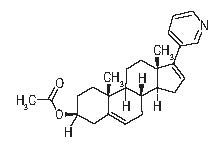
Abiraterone acetate is a white to off-white, non-hygroscopic, crystalline powder. Its molecular formula is C
Abiraterone acetate tablets, USP are available in 250 mg uncoated tablets with the following inactive ingredients:
• 250 mg uncoated tablets: colloidal silicon dioxide, croscarmellose sodium, lactose monohydrate, magnesium stearate, microcrystalline cellulose, povidone, sodium lauryl sulfate and sodium starch glycolate (derived from potato).
7CLINICAL STUDIES
The efficacy and safety of abiraterone acetate with prednisone was established in three randomized placebo-controlled international clinical studies. All patients in these studies received a GnRH analog or had prior bilateral orchiectomy. Patients with prior ketoconazole treatment for prostate cancer and a history of adrenal gland or pituitary disorders were excluded from these trials. Concurrent use of spironolactone was not allowed during the study period.
COU-AA-301: Patients with metastatic CRPC who had received prior docetaxel chemotherapy
In COU-AA-301 (NCT00638690), a total of 1195 patients were randomized 2:1 to receive either abiraterone acetate orally at a dose of 1,000 mg once daily in combination with prednisone 5 mg orally twice daily (N=797) or placebo once daily plus prednisone 5 mg orally twice daily (N=398). Patients randomized to either arm were to continue treatment until disease progression (defined as a 25% increase in PSA over the patient’s baseline/nadir together with protocol-defined radiographic progression and symptomatic or clinical progression), initiation of new treatment, unacceptable toxicity or withdrawal.
The following patient demographics and baseline disease characteristics were balanced between the treatment arms. The median age was 69 years (range 39–95) and the racial distribution was 93% Caucasian, 3.6% Black, 1.7% Asian, and 1.6% Other. Eighty-nine percent of patients enrolled had an ECOG performance status score of 0–1 and 45% had a Brief Pain Inventory-Short Form score of ≥4 (patient’s reported worst pain over the previous 24 hours). Ninety percent of patients had metastases in bone and 30% had visceral involvement. Seventy percent of patients had radiographic evidence of disease progression and 30% had PSA-only progression. Seventy percent of patients had previously received one cytotoxic chemotherapy regimen and 30% received two regimens.
The protocol pre-specified interim analysis was conducted after 552 deaths and showed a statistically significant improvement in overall survival (OS) in patients treated with abiraterone acetate with prednisone compared to patients in the placebo with prednisone arm (Table 9 and Figure 1). An updated survival analysis was conducted when 775 deaths (97% of the planned number of deaths for final analysis) were observed. Results from this analysis were consistent with those from the interim analysis (Table 7).
Table 7: Overall Survival of Patients Treated with Either Abiraterone Acetate or Placebo in Combination with Prednisone in COU-AA-301 (Intent-to-Treat Analysis)
1 p-value is derived from a log-rank test stratified by ECOG performance status score (0-1 vs. 2), pain score (absent vs. present), number of prior chemotherapy regimens (1 vs. 2), and type of disease progression (PSA only vs. radiographic).
2 Hazard Ratio is derived from a stratified proportional hazards model. Hazard ratio <1 favors abiraterone acetate with prednisone.
Figure 1: Kaplan-Meier Overall Survival Curves in COU-AA-301 (Intent-to-Treat Analysis)
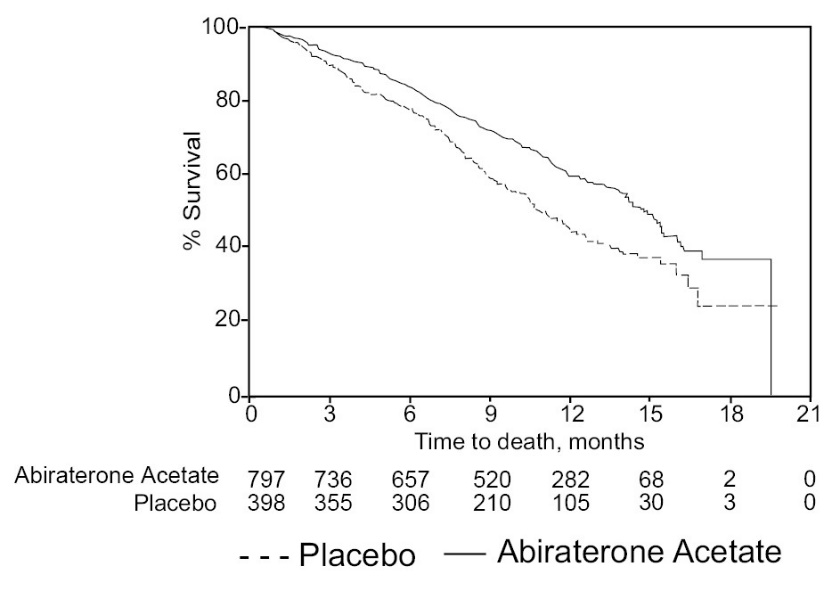
COU-AA-302: Patients with metastatic CRPC who had not received prior cytotoxic chemotherapy
In COU-AA-302, (NCT00887198), 1088 patients were randomized 1:1 to receive either abiraterone acetate orally at a dose of 1,000 mg once daily (N=546) or Placebo orally once daily (N=542). Both arms were given concomitant prednisone 5 mg twice daily. Patients continued treatment until radiographic or clinical (cytotoxic chemotherapy, radiation or surgical treatment for cancer, pain requiring chronic opioids, or ECOG performance status decline to 3 or more) disease progression, unacceptable toxicity or withdrawal. Patients with moderate or severe pain, opiate use for cancer pain, or visceral organ metastases were excluded.
Patient demographics were balanced between the treatment arms. The median age was 70 years. The racial distribution of patients treated with abiraterone acetate was 95% Caucasian, 2.8% Black, 0.7% Asian and 1.1% Other. The ECOG performance status was 0 for 76% of patients, and 1 for 24% of patients. Co-primary efficacy endpoints were overall survival and radiographic progression-free survival (rPFS). Baseline pain assessment was 0–1 (asymptomatic) in 66% of patients and 2–3 (mildly symptomatic) in 26% of patients as defined by the Brief Pain Inventory-Short Form (worst pain over the last 24 hours).
Radiographic progression-free survival was assessed with the use of sequential imaging studies and was defined by bone scan identification of 2 or more new bone lesions with confirmation (Prostate Cancer Working Group 2 criteria) and/or modified Response Evaluation Criteria In Solid Tumors (RECIST) criteria for progression of soft tissue lesions. Analysis of rPFS utilized centrally-reviewed radiographic assessment of progression.
The planned final analysis for OS, conducted after 741 deaths (median follow up of 49 months) demonstrated a statistically significant OS improvement in patients treated with abiraterone acetate with prednisone compared to those treated with placebo with prednisone (Table 8 and Figure 2). Sixty-five percent of patients on the abiraterone acetate arm and 78% of patients on the placebo arm used subsequent therapies that may prolong OS in metastatic CRPC. Abiraterone acetate was used as a subsequent therapy in 13% of patients on the abiraterone acetate arm and 44% of patients on the placebo arm.
Table 8: Overall Survival of Patients Treated with Either Abiraterone Acetate or Placebo in Combination with Prednisone in COU-AA-302 (Intent-to-Treat Analysis)
Figure 2: Kaplan Meier Overall Survival Curves in COU-AA-302
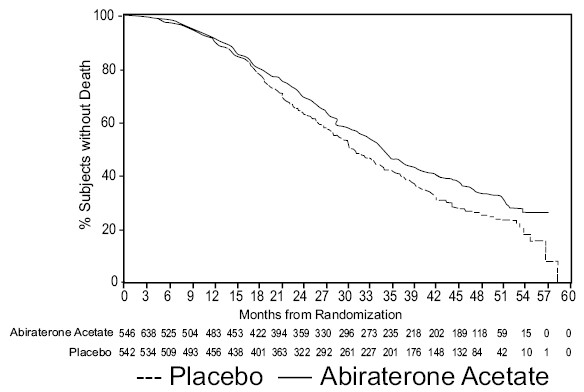
At the pre-specified rPFS analysis, 150 (28%) patients treated with abiraterone acetate with prednisone and 251 (46%) patients treated with placebo with prednisone had radiographic progression. A significant difference in rPFS between treatment groups was observed (Table 9 and Figure 3).
Table 9: Radiographic Progression-free Survival of Patients Treated with Either Abiraterone Acetate or Placebo in Combination with Prednisone in COU-AA-302 (Intent-to-Treat Analysis)
Figure 3: Kaplan Meier Curves of Radiographic Progression-free Survival in COU-AA-302 (Intent-to-Treat Analysis)
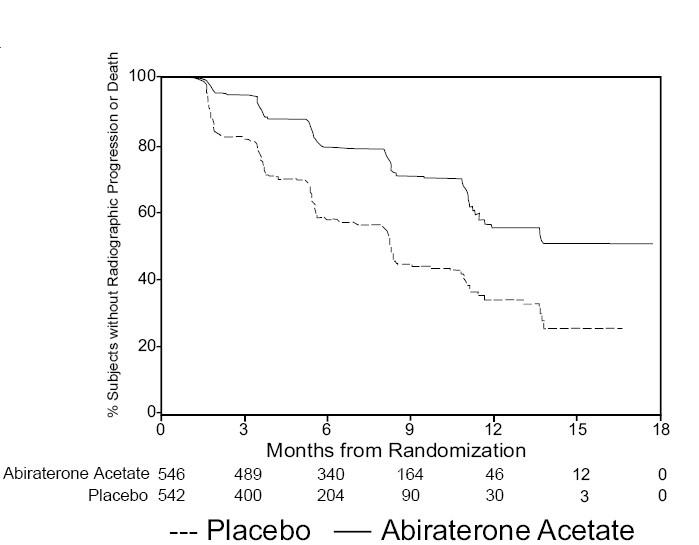
The primary efficacy analyses are supported by the following prospectively defined endpoints. The median time to initiation of cytotoxic chemotherapy was 25.2 months for patients in the abiraterone acetate arm and 16.8 months for patients in the placebo arm (HR=0.580; 95% CI: [0.487, 0.691], p < 0.0001).
The median time to opiate use for prostate cancer pain was not reached for patients receiving abiraterone acetate and was 23.7 months for patients receiving placebo (HR=0.686; 95% CI: [0.566, 0.833], p=0.0001). The time to opiate use result was supported by a delay in patient reported pain progression favoring the abiraterone acetate arm.
LATITUDE: Patients with metastatic high-risk CSPC
In LATITUDE (NCT01715285), 1199 patients with metastatic high-risk CSPC were randomized 1:1 to receive either abiraterone acetate orally at a dose of 1,000 mg once daily with prednisone 5 mg once daily (N=597) or placebos orally once daily (N=602). High-risk disease was defined as having at least two of three risk factors at baseline: a total Gleason score of ≥8, presence of ≥3 lesions on bone scan, and evidence of measurable visceral metastases. Patients with significant cardiac, adrenal, or hepatic dysfunction were excluded. Patients continued treatment until radiographic or clinical disease progression, unacceptable toxicity, withdrawal or death. Clinical progression was defined as the need for cytotoxic chemotherapy, radiation or surgical treatment for cancer, pain requiring chronic opioids, or ECOG performance status decline to ≥3.
Patient demographics were balanced between the treatment arms. The median age was 67 years among all randomized subjects. The racial distribution of patients treated with abiraterone acetate was 69% Caucasian, 2.5% Black, 21% Asian, and 8.1% Other. The ECOG performance status was 0 for 55%, 1 for 42%, and 2 for 3.5% of patients. Baseline pain assessment was 0-1 (asymptomatic) in 50% of patients, 2-3 (mildly symptomatic) in 23% of patients, and ≥4 in 28% of patients as defined by the Brief Pain Inventory-Short Form (worst pain over the last 24 hours).
A major efficacy outcome was overall survival. The pre-specified interim analysis after 406 deaths showed a statistically significant improvement in OS in patients on abiraterone acetate with prednisone compared to those on placebos. Twenty-one percent of patients on the abiraterone acetate arm and 41% of patients on the placebos arm received subsequent therapies that may prolong OS in metastatic CRPC. An updated survival analysis was conducted when 618 deaths were observed. The median follow-up time was 52 months. Results from this analysis were consistent with those from the pre-specified interim analysis (Table 10 and Figure 4). At the updated analysis, 29% of patients on the abiraterone acetate arm and 45% of patients on the placebos arm received subsequent therapies that may prolong OS in metastatic CRPC.
Table 10: Overall Survival of Patients Treated with Either Abiraterone Acetate or Placebos in LATITUDE (Intent-to-Treat Analysis)
NE=Not estimable
1 This is based on the pre-specified interim analysis
2 p value is from log-rank test stratified by ECOG PS score (0/1 or 2) and visceral (absent or present).
3 Hazard Ratio is derived from a stratified proportional hazards model. Hazard ratio <1 favors abiraterone acetate with prednisone.
Figure 4: Kaplan-Meier Plot of Overall Survival; Intent-to-treat Population in LATITUDE Updated Analysis
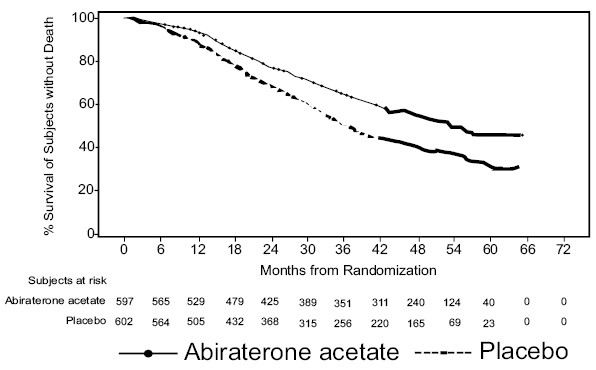
The major efficacy outcome was supported by a statistically significant delay in time to initiation of chemotherapy for patients in the abiraterone acetate arm compared to those in the placebos arm. The median time to initiation of chemotherapy was not reached for patients on abiraterone acetate with prednisone and was 38.9 months for patients on placebos (HR = 0.44; 95% CI: [0.35, 0.56], p < 0.0001).
8HOW SUPPLIED/STORAGE AND HANDLING
Abiraterone Acetate Tablets, USP 250 mg – Uncoated tablets
Abiraterone acetate tablets, USP are available as white to off-white, oval tablets debossed with "WW597" on one side.
NDC 82249-
Storage and Handling
Store at 20°C to 25°C (68°F to 77°F); excursions permitted in the range from 15°C to 30°C (59°F to 86°F)
Keep out of reach of children.
Based on its mechanism of action, abiraterone acetate tablets may harm a developing fetus. Women who are pregnant or women who may be pregnant should not handle abiraterone acetate 250 mg uncoated tablets or other abiraterone acetate tablets if broken, crushed, or damaged without protection, e.g., gloves
9PATIENT COUNSELING INFORMATION
Advise the patient to read the FDA-approved patient labeling (Patient Information)
Hypokalemia, Fluid Retention, and Cardiovascular Adverse Reactions
- Inform patients that abiraterone acetate tablets are associated with hypertension, hypokalemia, and peripheral edema that may lead to QT prolongation and Torsades de Pointes in patients who develop hypokalemia while taking abiraterone acetate tablets. Advise patients that their blood pressure, serum potassium and signs and symptoms of fluid retention will be monitored clinically at least monthly. Advise patients to adhere to corticosteroids and to report symptoms of hypertension, hypokalemia, or edema to their healthcare provider
Adrenocortical Insufficiency
- Inform patients that abiraterone acetate tablets with prednisone is associated with adrenal insufficiency. Advise patients to report symptoms of adrenocortical insufficiency to their healthcare provider
Hepatotoxicity
- Inform patients that abiraterone acetate tablets are associated with severe hepatotoxicity. Inform patients that their liver function will be monitored using blood tests. Advise patients to immediately report symptoms of hepatotoxicity to their healthcare provider
Hypoglycemia
- Inform patients that severe hypoglycemia has been reported when abiraterone acetate was administered to patients with pre-existing diabetes who were receiving medications containing thiazolidinediones (including pioglitazone) or repaglinide, antidiabetic drugs. Advise patients with diabetes to monitor glucose levels during and after treatment with abiraterone acetate
Use in Combination with Radium Ra 223 Dichloride
- Advise patients that radium Ra 223 dichloride showed an increase in mortality and an increased rate of fracture when used in combination with abiraterone acetate tablets plus prednisone/prednisolone. Inform patients to speak with their healthcare provider about any other medications or treatment they are currently taking for prostate cancer
Dosing and Administration
- Inform patients that abiraterone acetate is taken once daily with prednisone (twice daily according to their healthcare provider’s instructions) and to not interrupt or stop either of these medications without consulting their healthcare provider.
- Inform patients receiving GnRH therapy that they need to maintain this treatment during the course of treatment with abiraterone acetate tablets.
- Instruct patients to take abiraterone acetate tablets as a single dose once daily on an
- Inform patients that if they miss a dose of abiraterone acetate tablets or prednisone, they should take their normal dose the following day. If more than one daily dose is skipped, inform patients to contact their healthcare provider
Embryo-Fetal Toxicity
- Inform patients that abiraterone acetate tablets may harm a developing fetus and can cause loss of pregnancy.
- Advise males with female partners of reproductive potential to use effective contraception during treatment and for 3 weeks after the final dose of abiraterone acetate tablets
- Advise females who are pregnant or women who may be pregnant not to handle abiraterone acetate 250 mg uncoated tablets if broken, crushed, or damaged without protection, e.g., gloves
Infertility
- Advise male patients that abiraterone acetate tablets may impair fertility [see
Distributed by:
Manufactured by:
PO Box 41
Sahab - Jordan
2INABI250TC-E

10PATIENT INFORMATION
Abiraterone Acetate Tablets, USP
What are abiraterone acetate tablets?
Abiraterone acetate tablets are a prescription medicine that are used along with prednisone. Abiraterone acetate tablets are used to treat men with prostate cancer that has spread to other parts of the body.
It is not known if abiraterone acetate tablets are safe and effective in females or children.
Before taking abiraterone acetate tablets, tell your healthcare provider about all of your medical conditions, including if you:
- have heart problems
- have liver problems
- have diabetes
- have a history of adrenal problems
- have a history of pituitary problems
- are receiving any other treatment for prostate cancer
- are pregnant or plan to become pregnant. Abiraterone acetate tablets can cause harm to your unborn baby and loss of pregnancy (miscarriage). Females who are or may become pregnant should not handle abiraterone acetate uncoated tablets or other abiraterone acetate tablets if broken, crushed, or damaged without protection, such as gloves.
- have a partner who is pregnant or may become pregnant.
- are breastfeeding or plan to breastfeed. It is not known if abiraterone acetate passes into your breastmilk.
Tell your healthcare provider about all the medicines you take or treatments you receive, including prescription and over-the-counter medicines, vitamins, and herbal supplements. Abiraterone acetate tablets can interact with many other medicines.
You should not start or stop any medicine before you talk with the healthcare provider that prescribed abiraterone acetate tablets.
Know the medicines you take. Keep a list of them with you to show to your healthcare provider and pharmacist when you get a new medicine.
How should I take abiraterone acetate tablets?
- Take abiraterone acetate tablets and prednisone exactly as your healthcare provider tells you.
- Take your prescribed dose of abiraterone acetate tablets 1 time a day.
- Your healthcare provider may change your dose if needed.
- Do not change or stop taking your prescribed dose of abiraterone acetate tablets or prednisone without talking with your healthcare provider first.
- Take abiraterone acetate tablets as a single dose one time a day on an
- Do not take abiraterone acetate with food. Taking abiraterone acetate with food may cause more of the medicine to be absorbed by the body than is needed and this may cause side effects.
- Swallow abiraterone acetate tablets whole. Do not crush or chew tablets.
- Take abiraterone acetate tablets with water.
- If you miss a dose of abiraterone acetate tablets or prednisone, take your prescribed dose the following day. If you miss more than 1 dose, tell your healthcare provider right away.
- Your healthcare provider will do blood tests to check for side effects.
What are the possible side effects of abiraterone acetate tablets?
Abiraterone acetate tablets may cause serious side effects including:
- High blood pressure (hypertension), low blood potassium levels (hypokalemia), fluid retention (edema), and irregular heartbeats can happen during treatment with abiraterone acetate tablets. This can be life threatening. To decrease the chance of this happening, you must take prednisone with abiraterone acetate tablets exactly as your healthcare provider tells you. Your healthcare provider will check your blood pressure, do blood tests to check your potassium levels, and check for any signs and symptoms of fluid retention every month during treatment with abiraterone acetate tablets.
Tell your healthcare provider if you get any of the following symptoms:
- Adrenal problems may happen if you stop taking prednisone, get an infection, or are under stress.
- Severe liver problems. You may develop changes in liver function blood tests. Your healthcare provider will do blood tests to check your liver before treatment with abiraterone acetate tablets and during treatment with abiraterone acetate tablets. Liver failure may occur, which can lead to death. Tell your healthcare provider right away if you notice any of the following changes:
- yellowing of the skin or eyes
- darkening of the urine
- severe nausea or vomiting
- Increased risk of bone fracture and death when abiraterone acetate tablets and prednisone or prednisolone, is used in combination with a type of radiation called radium Ra 223 dichloride. Tell your healthcare provider about any other treatments you are taking for prostate cancer.
- Severe low blood sugar (hypoglycemia). Severe low blood sugar with abiraterone acetate tablets can happen in people who have diabetes and take certain antidiabetic medicines. You and your healthcare provider should check your blood sugar levels regularly during treatment with abiraterone acetate tablets and after you stop treatment. Your healthcare provider may also need to change the dose of your antidiabetic medicines. Signs and symptoms of low blood sugar may include:
The most common side effects of abiraterone acetate tablets include:
Abiraterone acetate tablets may cause fertility problems in males, which may affect the ability to father children. Talk to your healthcare provider if you have concerns about fertility.
These are not all the possible side effects of abiraterone acetate tablets. Call your healthcare provider for medical advice about side effects. You may report side effects to FDA at 1-800-FDA-1088.
How should I store abiraterone acetate tablets?
- Store abiraterone acetate tablets at room temperature between 68
Keep abiraterone acetate tablets and all medicines out of the reach of children.
General information about the safe and effective use of abiraterone acetate tablets.
Medicines are sometimes prescribed for purposes other than those listed in a Patient Information leaflet. Do not use abiraterone acetate tablets for a condition for which it was not prescribed. Do not give abiraterone acetate tablets to other people, even if they have the same symptoms that you have. It may harm them.
You can ask your healthcare provider or pharmacist for information about abiraterone acetate tablets that is written for health professionals.
What are the ingredients of abiraterone acetate tablets?
Active ingredient: abiraterone acetate
Inactive ingredients: 250 mg uncoated tablets: colloidal silicon dioxide, croscarmellose sodium, lactose monohydrate, magnesium stearate, microcrystalline cellulose, povidone, sodium lauryl sulfate and sodium starch glycolate (derived from potato).
This Patient Information has been approved by the U.S. Food and Drug Administration.
Distributed by:
Manufactured by:
PO Box 41
2INABI250TMC-E

11PRINCIPAL DISPLAY PANEL
NDC 82249-010-12
Abiraterone Acetate
Rx Only
120 Tablets
120 Tablets
